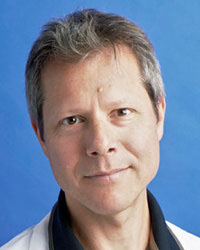Marc Abramowitz Group

Project at a glance
Molecular Genetics and Genomic Medicine - M2G2
Our group takes advantage of its close interaction with the Division of Genetic Medicine, HUG university hospitals, Geneva. With their informed consent, we study the patients’ and relatives’ genomes for causes of genetic disease or predisposition.
Our long-term goal is to identify and validate medical interventions based on patients’ genomic analysis, that improve health outcome.
There are two axes to our research.
1. Identify causes and mechanisms of genetic disease
The first step consists of gene discovery in relatively small cohorts of patients with a similar, unexplained phenotype, assuming one highly penetrant mutation, using whole exome or whole genome sequencing. When a candidate gene is identified, additional patients are sought via international networks, including the Matchmaker Exchange platform. Causal implication of the gene is validated, when appropriate, in zebrafish, using genome editing (CRISPR-Cas9). Plausible hypotheses regarding the mechanism of the disease are investigated by expression and functional studies in cellular and animal models.
2. Identify and mitigate predisposition to common disease
The identification approach consists of high-throughput correlation of digitalized clinical data (phenome) in a large cohort of patients, with their genomic data, as detailed as possible - ultimately whole genome sequencing.
A second step focuses on candidate medical interventions, or environmental changes, identified form electronic health records or other databases, in patients with a similar clinical presentation, and aims in comparing outcomes in groups of patients stratified for their genomic data.
This retrospective study, when successful, opens the way for a translational research aimed at the prospective validation of the candidate intervention in new patients who carry the genome predisposition.

